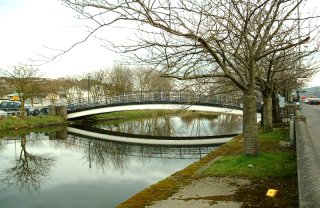A large body of Scottish troops under Major-General Robert Munroe landed in Carrickfergus on 15 April 1642 to assist in repressing the insurrection.
The English Civil War between the forces of the King and those of Parliament had begun, yet this army was largely independent of both, or, to speak more plainly the suppression of the rebellious Irish suited both sides. An English Army under the Marshal Lord Conway (note that the Bagenals had long since ceased to influence or hold this military position) joined them and the joint force marched on Newry.
The Irish in possession of Newry had not the slightest chance of withstanding such an army and those who did not flee retired within the Castle, within which was held some number of prisoners from the original sacking. One such (a Mr Reading) was freed and sent to bring this news to the attacking force and to inform Munroe that the town was his.
The houses (with the exception of a very few – the Viscountess of Iveagh was in the town at the time) were plundered and the castle was besieged. Finally the Irish commander agreed to surrender on terms. These, it was made most clear by Munroe, applied to the garrison alone (who were subsequently disarmed and allowed to walk free) and certainly not to the townspeople.
On the following day several of those who had been in the Castle, together with many of the merchants and tradesmen of the town and two ‘Pope’s pedlars’ (as they referred insolently to the Catholic priests) were brought to the bridge of the town (probably Ballybot) and butchered, some hanged, some shot and some drowned. The English portion of the army was responsible but Munroe neither restrained nor condemned, in his memoirs of the affair, he calmly recorded that ‘ we entered into examination of the townsmen if they were all Papists and – the indifferent being separated from the bad – 60, with two priests were shot and hanged’.
The Scottish soldiers then wanted their fun. A large number of women and children (it is said one hundred and fifty) had taken refuge beside the bridge. These were mercilessly butchered by the Scottish troops, among them Orkney and
They would all have perished had not a Major Turner – one of their own number – intervened. Turner, writing of the atrocity later says, ‘Our sojors (who sometimes are cruell for no other reason than because man’s wicked nature leads him to be so) seeing such pranks played by authoritie at the bridge (i.e. the previous butchery of townspeople by the English forces), thought they might doe as much.’
Many prisoners in the hands of the Irish elsewhere than in Newry were subsequently murdered in reprisal – according to J F Small , ‘probably equalling the number slaughtered at Newry’.
Although the foreigner was eventually to prevail and effect far more dreadful suffering on the Irish over the following centuries, there was still to be one more great victory for the Irish.
Owen Roe O’Neill, the military leader of the Confederation of Kilkenny gained one of the greatest ever Irish victories when he routed the Scottish troops under the command of the same General Munroe at the Battle of Benburb in 1646. ‘Three thousand Scots were slain or drowned in flight. We wonder (Small muses in his Sketch) whether in the throng of battle the Irish soldiers’ thoughts were of avenging the ghastly horrors of the Bridge at Newry.’
Whatever is the case, the divided leadership of the Confederation of Kilkenny signally failed to follow up immediately on this great victory: O’Neill was summoned south and, as a direct result, the cause of
…. Newry’s First Castle …
